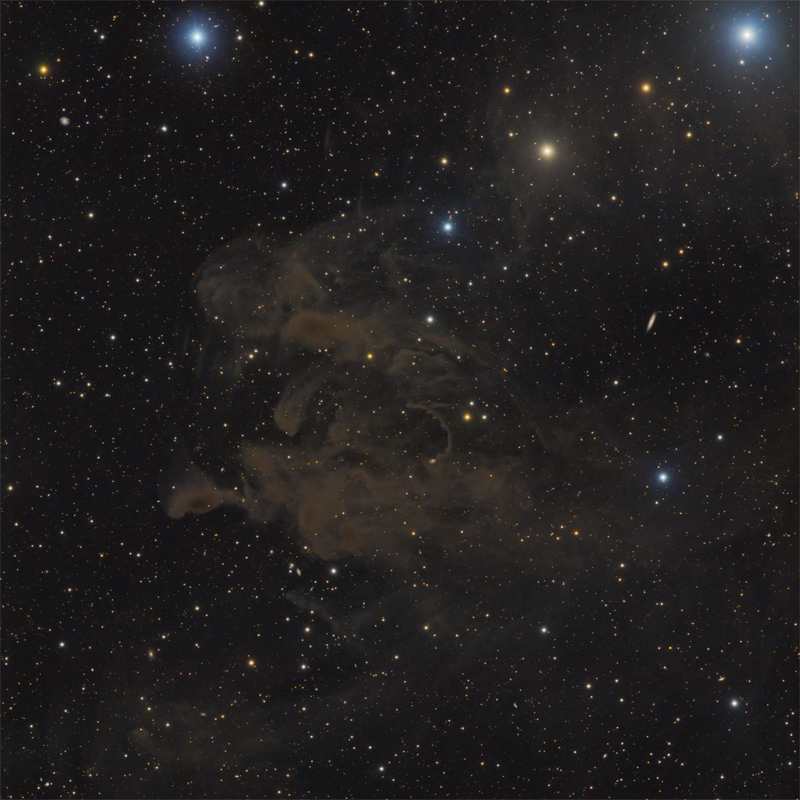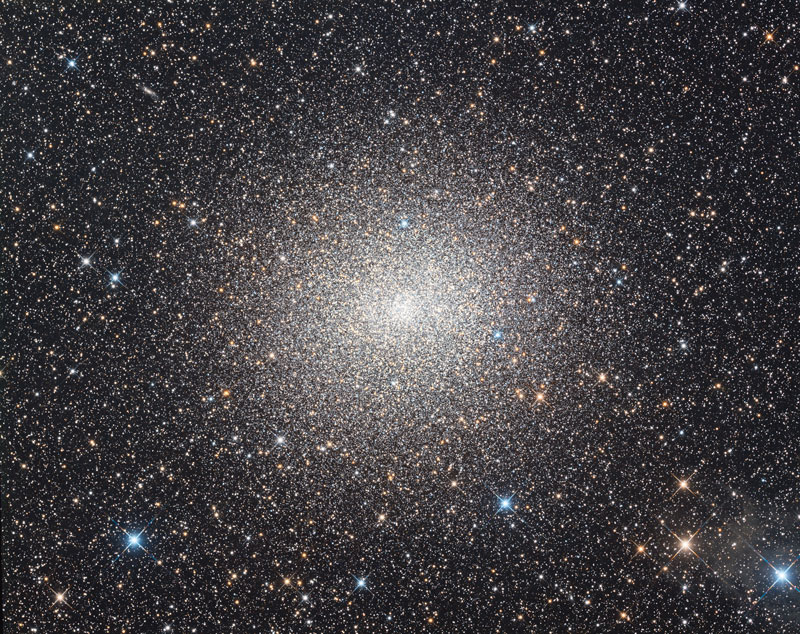Page 1 of 2
Found Images: 2019 August
Posted: Thu Aug 01, 2019 7:33 am
by bystander
Have you seen a great image or video somewhere that you think would make a great APOD? Nominate it for APOD! Please post as much information here as you have about the image/video with a link to any source(s) for it you know of here, and the editors will take a look.
When posting the image itself, please do not post anything larger than a thumbnail here; please honor the copyright holder's copyright.
Please keep hotlinked images under 400K.
Thank you!
<< Previously
Re: Found Images: 2019 August
Posted: Thu Aug 01, 2019 1:06 pm
by starsurfer
Re: Found Images: 2019 August
Posted: Thu Aug 01, 2019 1:11 pm
by starsurfer
Dr 14
https://www.astrobin.com/412198/
Copyright: Marcel Drechsler/Chilescope
The emission nebula to the left is Sh2-305. More information about Marcel Drechsler's discoveries can be found
here.
Re: Found Images: 2019 August
Posted: Sun Aug 04, 2019 2:27 pm
by starsurfer
NGC 5033 and NGC 5005
http://www.capella-observatory.com/Imag ... 5_5033.htm
Copyright: Josef Pöpsel, Frank Sackenheim and Stefan Binnewies
Re: Found Images: 2019 August
Posted: Sun Aug 04, 2019 2:31 pm
by starsurfer
Re: Found Images: 2019 August
Posted: Sun Aug 04, 2019 2:34 pm
by starsurfer
Longmore 9
http://www.chart32.de/index.php/component/k2/item/303
Copyright: CHART32
Processing: Johannes Schedler
ESO: A Cosmic Vista
Posted: Mon Aug 05, 2019 2:52 pm
by bystander
A Cosmic Vista
ESO Picture of the Week | 2019 Aug 05
The telescope in this eye-catching picture is appropriately named
VISTA, short for the Visible and Infrared Survey Telescope for Astronomy. The telescope is located at ESO’s
Paranal Observatory in Chile, where the altitude and arid climate make for cloudless skies and excellent viewing conditions.
Different phenomena in the Universe produce different
kinds of light, only a tiny fraction of which is visible to the human eye. VISTA observes
infrared light, the same radiation that we can feel as heat. The three-tonne camera housed inside the telescope is extremely sensitive, allowing VISTA to detect this kind of light from very distant sources in the Universe and to produce both stunning images and groundbreaking scientific results.
Enjoying the same exceptional skies as VISTA is another of ESO’s facilities, the Very Large Telescope (
VLT), which can be just about be seen atop a distant peak. Despite the impressive size and ingenuity of these facilities, they cannot help but be dwarfed by the sheer majesty of the Universe above, as demonstrated by the kaleidoscopic
Milky Way arching across the panorama.
This image was taken by
ESO photo ambassador Petr Horálek.
HEIC: Galactic Creatures at Play (UGC 2369)
Posted: Mon Aug 05, 2019 2:58 pm
by bystander
Galactic Creatures at Play
ESA Hubble Picture of the Week | 2019 Aug 05
The pair of strange, luminescent creatures at play in this image are actually
galaxies — realms of millions upon millions of
stars.
This galactic duo is known as
UGC 2369. The galaxies are interacting, meaning that their mutual gravitational attraction is pulling them closer and closer together and distorting their shapes in the process. A tenuous bridge of gas, dust, and stars can be seen connecting the two galaxies,, during which they pulled material out into space across the diminishing divide between them.
Interaction with others is a common event in the history of most galaxies. For larger galaxies like the
Milky Way, the majority of these interactions involve significantly smaller so-called
dwarf galaxies. But every few aeons, a more momentous event can occur. For our home galaxy, the next big event will take place in about four billion years, when it will collide with its bigger neighbour, the
Andromeda Galaxy. Over time, the two galaxies will likely merge into one — already nicknamed
Milkomeda.
Re: HEIC: Galactic Creatures at Play (UGC 2369)
Posted: Mon Aug 05, 2019 6:55 pm
by Ann
bystander wrote: ↑Mon Aug 05, 2019 2:58 pm
Galactic Creatures at Play
ESA Hubble Picture of the Week | 2019 Aug 05
The pair of strange, luminescent creatures at play in this image are actually
galaxies — realms of millions upon millions of
stars.
This galactic duo is known as
UGC 2369. The galaxies are interacting, meaning that their mutual gravitational attraction is pulling them closer and closer together and distorting their shapes in the process. A tenuous bridge of gas, dust, and stars can be seen connecting the two galaxies,, during which they pulled material out into space across the diminishing divide between them.
Interaction with others is a common event in the history of most galaxies. For larger galaxies like the
Milky Way, the majority of these interactions involve significantly smaller so-called
dwarf galaxies. But every few aeons, a more momentous event can occur. For our home galaxy, the next big event will take place in about four billion years, when it will collide with its bigger neighbour, the
Andromeda Galaxy. Over time, the two galaxies will likely merge into one — already nicknamed
Milkomeda.
According to Principal Galaxy Catalog (PGC), which I access through my software, this galactic pair is some 400 light-years away. According to PGC, one member of the pair, NGC 2369B, has a B magnitude of ~15.5 and a far infrared magnitude of ~11. That's very dusty!!!
The ESA/Hubble picture of this pair was made using two filters, 435 nm (
really blue) and 814 nm (near infrared). With such a choice of filters, all the blue and red details will be enhanced, or at least that's my understanding.
Note that the blue galaxy is full of white knots, which I take to mean that it is bursting with star formation. Since star formation and dust usually go hand in hand, it makes sense that there would be a starburst in one galaxy and the enormous amount of dust in the other(?)!
Ann
Re: Found Images: 2019 August
Posted: Tue Aug 06, 2019 4:16 pm
by starsurfer
Re: Found Images: 2019 August
Posted: Wed Aug 07, 2019 9:24 am
by starsurfer
Cat's Eye Nebula (NGC 6543)
https://www.pbase.com/skybox/image/169494880
Copyright: Kevin Quin
Re: Found Images: 2019 August
Posted: Wed Aug 07, 2019 9:25 am
by starsurfer
Re: Found Images: 2019 August
Posted: Wed Aug 07, 2019 9:26 am
by starsurfer
Re: Found Images: 2019 August
Posted: Sat Aug 10, 2019 11:08 am
by starsurfer
IC 4592
http://www.atacama-photographic-observa ... php?id=147
Copyright: Thierry Demange, Richard Galli and Thomas Petit
Re: Found Images: 2019 August
Posted: Sun Aug 11, 2019 4:52 pm
by starsurfer
Re: Found Images: 2019 August
Posted: Mon Aug 12, 2019 10:44 am
by starsurfer
HEIC: The Inky Abyss (NGC 2022)
Posted: Mon Aug 12, 2019 2:51 pm
by bystander
The Inky Abyss
ESA Hubble Picture of the Week | 2019 Aug 12
Although it looks more like an entity seen through a microscope than a telescope, this rounded object, named
NGC 2022, is certainly no alga or tiny, blobby jellyfish. Instead, it is a vast orb of gas in space, cast off by an ageing star. The star is visible in the orb's centre, shining through the gases it formerly held onto for most of its stellar life.
When stars like the Sun grow advanced in age, they expand and glow red. These so-called
red giants then begin to lose their outer layers of material into space. More than half of such a star's mass can be shed in this manner, forming a shell of surrounding gas. At the same time, the star's core shrinks and grows hotter, emitting ultraviolet light that causes the expelled gases to glow.
This type of object is called, somewhat confusingly, a
planetary nebula, though it has nothing to do with planets. The name derives from the rounded, planet-like appearance of these objects in early telescopes.
NGC 2022 is located in the constellation of
Orion (
The Hunter).
AAS: Growing Globular Clusters from Mergers
Posted: Tue Aug 13, 2019 5:00 pm
by bystander
Growing Globular Clusters from Mergers
AAS NOVA Featured Image | 2019 Aug 12
Susanna Kohler wrote:
How do globular clusters — massive and dense gravitationally bound stellar systems — form? A team of scientists led by Natalia Lahén (University of Helsinki, Finland) explores the possibility that the mergers of gas-rich dwarf galaxies can result in the formation of massive, low-metallicity clusters of stars much like the local globular clusters we observe today. The beautiful series of images above are frames from the authors’ hydrodynamical simulations of the aftermath of a dwarf-galaxy merger. The three sets of panels show surface density of stars (left) and gas (center), and the thermal gas pressure (right), at two times during the simulation (the bottom panels are from 2 million years later than the top). The simulations demonstrate the formation of hundreds of stellar clusters in the filamentary gas structures after merger, including some with properties like local globular clusters.
The Formation of Low-metallicity Globular Clusters in Dwarf Galaxy Mergers ~ Natalia Lahén
et al
Re: Found Images: 2019 August
Posted: Wed Aug 14, 2019 1:18 pm
by starsurfer
IC 5076
http://astro-koop.de/?attachment_id=2042
Copyright: Stefan Heutz, Wolfgang Ries and Michael Breite
Re: Found Images: 2019 August
Posted: Thu Aug 15, 2019 1:29 pm
by starsurfer
NGC 1999
https://www.astrobin.com/345178/
Copyright: Ben Koltenbah
Re: Found Images: 2019 August
Posted: Thu Aug 15, 2019 1:32 pm
by starsurfer
Re: Found Images: 2019 August
Posted: Thu Aug 15, 2019 1:35 pm
by starsurfer
Re: Found Images: 2019 August
Posted: Sat Aug 17, 2019 1:10 pm
by starsurfer
Re: Found Images: 2019 August
Posted: Sun Aug 18, 2019 4:11 pm
by starsurfer
Re: Found Images: 2019 August
Posted: Sun Aug 18, 2019 6:33 pm
by Ann
Spacetelescope wrote:
In 2001, a calcium-rich supernova called 2001co was observed in NGC 5559. Calcium-rich supernovae (Ca-rich SNe) are described as “fast-and-faint”, as they're less luminous than other types of supernovae and also evolve more rapidly, to reveal spectra dominated by strong calcium lines. 2001co occurred within the disc of NGC 5559 near star-forming regions, but Ca-rich SNe are often observed at large distances from the nearest galaxy, raising curious questions about their progenitors.
A quick Google search turned up no image of Supernova 2001co apart from the blurry image at right.
Ann









